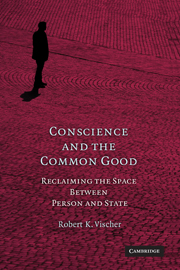10 - The Legal Profession
Published online by Cambridge University Press: 05 June 2012
Summary
In tracing the implications of conscience's relational dimension for law, this book has thus far focused on law's substance. But the law's substance is relevant only in so far as it applies to the real-world experiences of citizens, and the paths of application are not automated. Human gatekeepers – lawyers and judges – are at the heart of the rule of law. If we aim to figure out how law can best facilitate conscience's flourishing, we need to figure out how conscience should (or should not) shape the professional roles of those who provide access to the law. If our society's commitment to conscience demands that the law maintain space for marketplace participants to integrate moral claims with their provision of goods and services – as I have argued in the previous chapters – do different rules apply when the good or service in question is the law itself?
From much of the legal profession, the traditional answer has been an emphatic “yes!” The predominant view of the lawyer is as a common carrier, charged with maximizing the client's interests within the bounds of the law. The lawyer's own claims of conscience are a threat to the client's autonomy if introduced into the representation. Far from being a venue for conscience's flourishing, the attorney-client relationship tends to be portrayed as a technical venture in which the client's stated objectives are translated by the lawyer into legal strategy.
- Type
- Chapter
- Information
- Conscience and the Common GoodReclaiming the Space Between Person and State, pp. 269 - 302Publisher: Cambridge University PressPrint publication year: 2009



